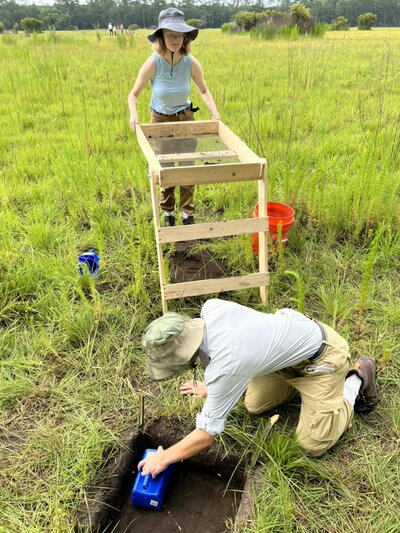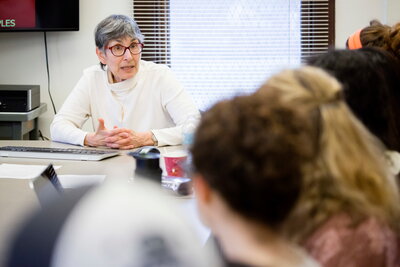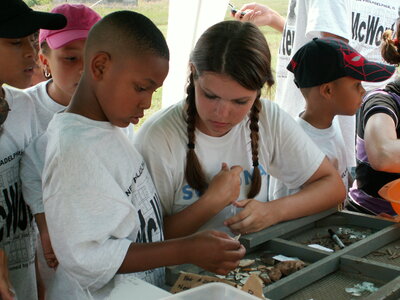
Program Description
Archaeology is concerned with the recovery, analysis, and interpretation of the material remains of past cultures and societies. Archaeologists seek to understand how humans in the past created and interacted with their social and natural environments and to conserve this history for present and future learning.

Started by the preeminent Julian H. Steward, Donald Lathrap, John C. McGregor, and Charles Bareis, the archaeology program at the University of Illinois, Urbana-Champaign, has traditionally emphasized strong training in archaeological methodologies, comparative approaches, theory, and fieldwork. Our graduate program provides students with in-depth training and education in a range of theoretical and methodological approaches to archaeological investigations. Graduate students interested in archaeology specialize in that field within the Department of Anthropology. Doctoral students earn a MA degree as they progress to the doctorate. (We do not offer a terminal M.A. track; students earn M.A. degrees as part of the Ph.D. program.) Graduate students in the archaeology track as well as those in the cultural anthropology track may wish to earn graduate minors in Museum Studies and in Heritage Studies.
We also offer a Historical Archaeology program.
We invite you to contact the Anthropology office or any one of the below named faculty and staff for more information on Archaeology at the University of Illinois at Urbana-Champaign. Students interested in applying for admission to our graduate program can also consult our online graduate admissions information.
Program Faculty and Labs
Our department archaeologists include Drs. Stanley Ambrose, Katelyn Bishop, Christopher Fennell, Susan Frankenberg, Lisa Lucero, Timothy Pauketat, Erin Riggs, Brandon Ritchison, and Helaine Silverman. They maintain active research programs, each focused on their particular areas of specialization, both in the United States and abroad. Other archaeologists are affiliated with the University of Illinois in non-teaching positions as research associates and as staff of the Illinois State Archaeological Survey, Public Service Archaeology & Architecture Program, and the Construction Engineering Research Laboratory.
Program Faculty and Lab Descriptions

Directed by Dr. Ambrose, The Anthropology Department Stable Isotope Laboratory (129 and 190 Davenport Hall) and Mass Spectrometry Laboratory (31 Natural Resources Building) provide facilities and opportunities for students to conduct research on reconstruction of prehistoric diets, climates and environments by isotopic analysis of bones, shells, plants and soils. The Lithic Technology lab contains comparative reference collections and resources for high magnification use-wear analysis. Dr. Ambrose also conducts ethnographic, archaeological, isotopic, and geoarchaeological field research in the Kenya and Ethiopia Rift Valley on the environmental context of early hominids, reconstruction of social networks, provenience of obsidian and ochre, Neolithic food production and the origin of modern human behavior.
Dr. Bishop is a Zooarchaeologist who studies the human-animal relationship across pre-contact America, particularly in the United States Southwest. Her work focuses on exploring the social, ceremonial, and symbolic roles that animals have played in past societies, especially in situations of emergent social and political complexity, where animals and their parts were actively involved in the creation of boundaries between groups of people and individuals. Dr. Bishop specializes in the analysis and identification of avifaunal remains from archaeological sites, and on the involvement of birds in the ceremonial lives of past peoples. She uses museum collections, legacy data, and archival documents to conduct her research. Dr. Bishop directs the Zooarchaeology Laboratory. The Zooarchaeology Lab periodically has volunteer and internship opportunities for undergraduate and graduate students. Please direct inquiries to Dr. Bishop at kjbishop@illinois.edu.
Directed by Dr. Fennell, the Historical Archaeology lab (296 Davenport Hall) provides undergraduate and graduate students research opportunites. Dr. Fennell's research initiatives include the development of interpretative frameworks focusing on regional systems theories, African diaspora studies, theories concerning ethnicities and racialization, stylistic and symbolic analysis of material culture, and the significance of consumption patterns. Dr. Fennell's projects include multi-year research concerning the social history of New Philadelphia, Illinois, an integrated town founded by a free African American in 1836. This project, which includes field schools funded by the National Science Foundation, attained designation of New Philadelphia as a National Historic Landmark based on its archaeological resources. Other initiatives have focused research on Brooklyn, Illinois, the first incorporated black town, and the African American settlement of Equal Rights outside Galena, Illinois, and the 19th century pottery communities of Edgefield, South Carolina.
Dr. Frankenberg is an archaeologist and bioanthropologist with broad interests in collections management, data curation, and the evolving roles of museums and their communities. Formerly a curator and member of international archaeological expeditions in Greece and Israel, she also conducted large scale archaeological surveys and excavations in the Tennessee Valley and cemetery excavations in Appalachia, the Midwest and mainland Greece. Her archaeological area of expertise is mortuary and ritual behavior during the Early to Middle Woodland in the eastern U.S. and in the Aegean and Eastern Mediterranean Bronze Age. Her current research focuses on issues of human age estimation and population structure, and on changing interfaces between the public, professionals and the academy in museums. She is the Coordinator of the interdisciplinary Museum Studies program.
Dr. Lucero includes undergraduate and graduate students in field and lab projects. She works with students interested in the ancient Maya, Mesoamerican cultures, complex societies, political systems, ritual and politics, the role of climate change and water management. Dr. Lucero currently is exploring how past practices provide lessons about a sustainable future. Her field goals for the next few years include excavating Maya residences that are threatened by modern farming. As part of the Valley of Peace Archaeology (VOPA) project in central Belize, Dr. Lucero also assesses landscape use overtime using a wide variety of methods—from settlement maps and artifacts to faunal and pollen remains.
Dr. Pauketat's research projects focus on regional archaeological investigations in the American Bottom and upper Midwest, exploring dynamics of large-scale changes to everyday life during the Mississippian period, and change over time in social practices under conditions of resettlement and physical displacement created by the impacts of urbanization at key centers such as Cahokia. Dr. Pauketat has directed excavations at several large village sites and homesteads dating from the 9th through 13th centuries AD. He now serves as Director of the Illinois State Archaeological Survey.
Dr. Riggs is a contemporary and historical archaeologist. Her research focuses on forced displacement in the recent past and material negotiations of national belonging. Her most recent works consider refugee resettlement in Delhi following the 1947 Partition of India and Pakistan. Through built landscape surveys, oral history collection, and archival research she documents families’ experiences within different types of resettlement spaces including evacuee properties and government-built colonies. This work informs understandings of effective responses to modern-day refugee crises and highlights the importance of flexible, multi-use forms or aid and housing. Dr. Riggs has also been involved with various historical archaeology projects in the US focused on immigrant experiences and attachment to place. In the next few years, her research goals include documenting Partition resettlement patterns in Kolkata (East India), developing cross-cultural comparisons of migrant experiences through collaborations with other archaeologists, and initiating local projects in Illinois to engage students in learning about historical archaeology.
Dr. Ritchison’s research focuses on large-scale and small-scale patterns of settlement and migration and how those patterns relate to climate change and sociopolitical organization in both the pre- and post-colonial periods in the Eastern U.S., and especially along the southeastern coast. His current projects examine the “Mississippianization” of the horticulturalists of the Middle Ohio valley and of the fisher-hunter-gatherers of the Georgia Coast, while paying particular attention to sites at risk of destruction due to climate change-induced sea-level rise. Methodologically, Dr. Ritchison employs GIS analysis of regional and intra-site settlement patterns, Bayesian chronological modeling, ceramic analysis, and geophysical survey.
Dr. Silverman (Professor Emerita) is an Andeanist specialized in south coastal Peru. Her current research has turned from the excavated past to a wide ranging study of the appropriation of the past in the present. She has a multi-year project in Cuzco, the former Inca capital, that investigates the conjunctions of archaeological heritage management, the globalized tourism industry, nationalism, and the production of local identities. She is also working on a comparative study of World Heritage Sites, in Durham (UK), Ironbridge Gorge (UK), Cahokia(U.S.) and Phimai (Thailand). She holds a UIUC Presidential Initiative Grant called ”The Mythic Mississippi” that seeks to assist downstate Illinois communities to deploy their cultural heritage resources in themed tourism routes. Dr. Silverman is the Director of the Collaborative for Cultural Heritage Management and Policy (CHAMP) at UIUC.
Program Research Resources

Research and employment opportunities as well as experience in curating and analyzing collections are provided by CERL (Construction Engineering Research Laboratory) and the Illinois State Archaeological Survey (or ISAS, formerly the Illinois Transportation Archaeological Research Program). ISAS, directed by Dr. Alleen Betzenhauser, which has 12,000 cubic feet of archaeological materials from over 3,000 Illinois sites, including historically important collections made by A.R. Kelly and Warren K. Moorehead from the world heritage and state historic site of Cahokia, early Hopewell mound excavations in the Illinois River valley by Moorehead and John McGregor, from the massive American Bottom FAI-270 Project collections, and from more recent work at sites such as Hoxie Farm and the East St. Louis Mound Center.
The Illinois State Geological Survey also maintains facilities on the University campus for isotope analysis, such as radiocarbon dating techniques.
Additional collections of archival and artifactual materials are curated by the Spurlock Museum of World Cultures, the University Archives, University Library, and Krannert Art Museum.
The Krannert collection includes ancient Peruvian pottery covering the major pre-Columbian periods. The Department of Anthropology also engages in public outreach efforts and participates in the annual Illinois Archaeological Awareness program.
We also host the African Diaspora Archaeology Network and Newsletter maintained by Dr. Fennell.
Program Graduate Students
Our graduate students are currently undertaking doctoral research throughout the world. Archaeology faculty regularly offer an array of methods courses (Archaeometry, Lithic Analysis, Ceramic Analysis, Surveying Techniques, GIS, Quantitative Analysis), regional survey courses (Africa, Central America, Europe, Mesoamerica, Illinois, and Mississippian region), topical courses (Cultural Heritage Management, Museum Studies, Historical Archaeology, Landscape Archaeology) and theory courses (History of Archaeological Theory, Archaeological Theory, Chiefdoms, Social Construction of Space). Other seminars are offered on a wide array of topics. In recent years, these seminars have included subjects such as: Advanced Scientific Methods in Archaeology (Archaeometry), Archaeological Approaches to Cultural Complexity, Chiefdoms and Early States, Cooperation and Exchange Networks, Human Evolutionary Ecology, Origins of Modern Humans, and Prehistory of Europe.
We offer many opportunities for students to conduct research with faculty in our archaeology labs and in our extensive research collections. A number of our faculty are conducting multi-year research programs in historical archaeology and prehistoric period archaeology. For examples of long-term research projects and related training opportunities, read about our Belize, Cahokia, Edgefield, and New Philadelphia projects. Additionally, we offer an archaeology field school on Sapelo Island, Georgia.
Historical Archaeology
Program Description
The archaeology program at the University of Illinois provides students with opportunities to specialize in historical archaeology, historical perspectives in archaeology and anthropology, and heritage studies. Founded by Julian H. Steward, Donald Lathrap, John C. McGregor, and Charles Bareis, our archaeology program has traditionally emphasized strong graduate training in archaeological methodologies, comparative approaches, theory and fieldwork. Our program offers Ph.D. and M.A. degrees, including an M.A. tracks concentrating on Cultural Heritage and Landscape and Museum Studies, offered in conjunction with the Department of Landscape Architecture. (We do not offer a terminal M.A. track; students earn M.A. degrees as part of the Ph.D. program.) The Departments of Anthropology and Landscape Architecture also host the Collaborative for Cultural Heritage Management and Policy (CHAMP) program, an interdisciplinary collaborative for the critical study of cultural heritage and museums in a global context.
Historical archaeology projects utilize artifactual, documentary, and oral history evidence in interpreting the past, and contribute to our understanding of the ways by which material culture can be used to study race, class, gender, and ethnic identities. Our research projects address questions such as: How can we analyze the material remains of past culture groups to account for the varied ways in which human societies organized themselves? What cultural, social, political, and ecological processes contributed to continuity or change in past social forms and material culture? How do we recognize and study the past dynamics of ethnicity, class, gender, and racialization in archaeological remains?
Archaeology faculty regularly offer an array of methods courses (archaeometry, lithic analysis, ceramic analysis, surveying techniques, GIS, quantitative analysis), regional survey courses (Africa, Central Andes, Europe, prehistoric and historic period North America), topical courses (cultural heritage management, museum studies, historic archaeology, landscape archaeology) and theory courses (history of archaeology, archaeological theory, chiefdoms, social construction of space, archaeology and racialization).

Historical archaeology also contributes to efforts of making visible those people poorly represented in the documentary record of the past, such as enslaved African Americans and Native Americans, and it helps us to appreciate their significant roles in shaping the history of the Americas. For example, the role of African Americans in building our nation's history is a central part of historical archaeology studies in North America. Such projects engage graduate and undergraduate students in examining the ways in which African Americans dealt with and persevered against past racializing ideologies, and the lessons to be learned from such studies of past racism, including possible ways of combating racialization in the present and future.
Our Department also engages in public outreach efforts, participates in the annual Illinois Archaeology Awareness program, and hosts a number of internet resources concerning public history and civic engagement in archaeology. In collaboration with the Department of African American Studies, we also host the peer reviewed Journal of African Diaspora Archaeology and Heritage (Taylor & Francis), and the African Diaspora Archaeology Network and Newsletter.
We invite you to contact the Anthropology office or any of our faculty for more information on historical archaeology, cultural heritage, landscape, and museum studies at the University of Illinois at Urbana-Champaign.
Program Faculty in Historical Archaeology
Christopher Fennell. Ph.D., University of Virginia, 2003; J.D. Georgetown University, 1989; Professor of Anthropology and Law. University Scholar. Member, Board of Directors, Society for Historical Archaeology (2012-15). Historical, prehistoric and contact periods in North America, African diaspora archaeology, cultural heritage management, regional systems analysis, stylistic and symbolic analysis of material culture, race and ethnicity theories, and consumption and production patterns; projects in historical archaeology and civic engagement.
Erin Riggs. PhD Binghamton University, 2019. Assistant Professor. Contemporary and historical archaeology; material culture studies, architectural studies, symbolic analysis; India, Pakistan, and the United States
Helaine Silverman. Ph.D., University of Texas at Austin, 1986; Professor and Director Emerita of the Collaborative for Cultural Heritage and Museum Practices.
Lisa Lucero. Ph.D., U.C.L.A., 1994; Professor. Historical, prehistoric and contact periods, complex societies, political systems, ritual and politics, water management, climate change, sustainability, Maya and Mesoamerican cultures.
Rebecca Ginsburg. Ph.D., University of California, Berkeley, 2001; J.D. University of Michigan, 1987; Associate Professor of Landscape Architecture. African archaeology, plantation archaeology, architectural history, material culture, cultural landscape studies.
Susan Frankenberg. Ph.D., Northwestern University, 1990; Graduate Faculty and Program Coordinator for Museum Studies. Cultural heritage and museums studies. Teaching courses in museum theory and practice, history and development of museums in light of world events and intellectual trends, issues of inclusion and exclusion in museums, museums as memory.
Katelyn J. Bishop. Ph.D., University of California, Los Angeles, 2019. Assistant Professor. Zooarchaeology, diet, social zooarchaeology, collections-based research, legacy collections and data, archival research, United States Southwest, Mesoamerican archaeology, human-animal relationships, ritual, iconography, and symbolism, social and ceremonial organization.
Brandon T. Ritchison. Ph.D., University of Georgia, 2019. Assistant Professor. Climate change, historical ecology, community organization, heritage management, colonial interactions, political economy, archaeological geophysics, migration, spatial analysis and GIS applications.
Program Contact Information
We invite you to contact the Historical Archaeology Program Director or Graduate Program Coordinator for more information on the Historical Archaeology Program at the University of Illinois at Urbana-Champaign.
Dr. Chris Fennell, Historical Archaeology Program Director
Department of Anthropology
University of Illinois at Urbana‐Champaign
109 Davenport Hall (MC‐148)
607 Mathews Avenue
Urbana, IL 61801
Phone: (217) 333-3616
Email: cfennell@illinois.edu
Ms. Joyce Dowell, Graduate Program Coordinator
Department of Anthropology
University of Illinois at Urbana‐Champaign
109F Davenport Hall (MC‐148)
607 Mathews Ave.
Urbana, IL 61801
Phone: (217)-300-9167
Email: joyce14@illinois.edu
Graduate Studies Program Contact Information
Graduate Studies Program Contact Information
We invite you to contact the Graduate Studies Program Coordinator, Director, and affiliated faculty and staff for more information on Sociocultural & Linguistic Anthropology at the University of Illinois at Urbana-Champaign.
Students interested in applying for admission to our graduate program can also consult our online graduate admissions information.
Dr. Krystal Smalls, Interim Director of Graduate Studies Program
Department of Anthropology
University of Illinois at Urbana‐Champaign
109 Davenport Hall (MC‐148)
607 Mathews Avenue
Urbana, IL 61801
Phone: Not Available
Email: ksmalls@illinois.edu
Ms. Joyce Dowell, Graduate Studies Program Coordinator
Department of Anthropology
University of Illinois at Urbana‐Champaign
109F Davenport Hall (MC‐148)
607 Mathews Ave.
Urbana, IL 61801
Phone: (217)-300-9167
Email: joyce14@illinois.edu